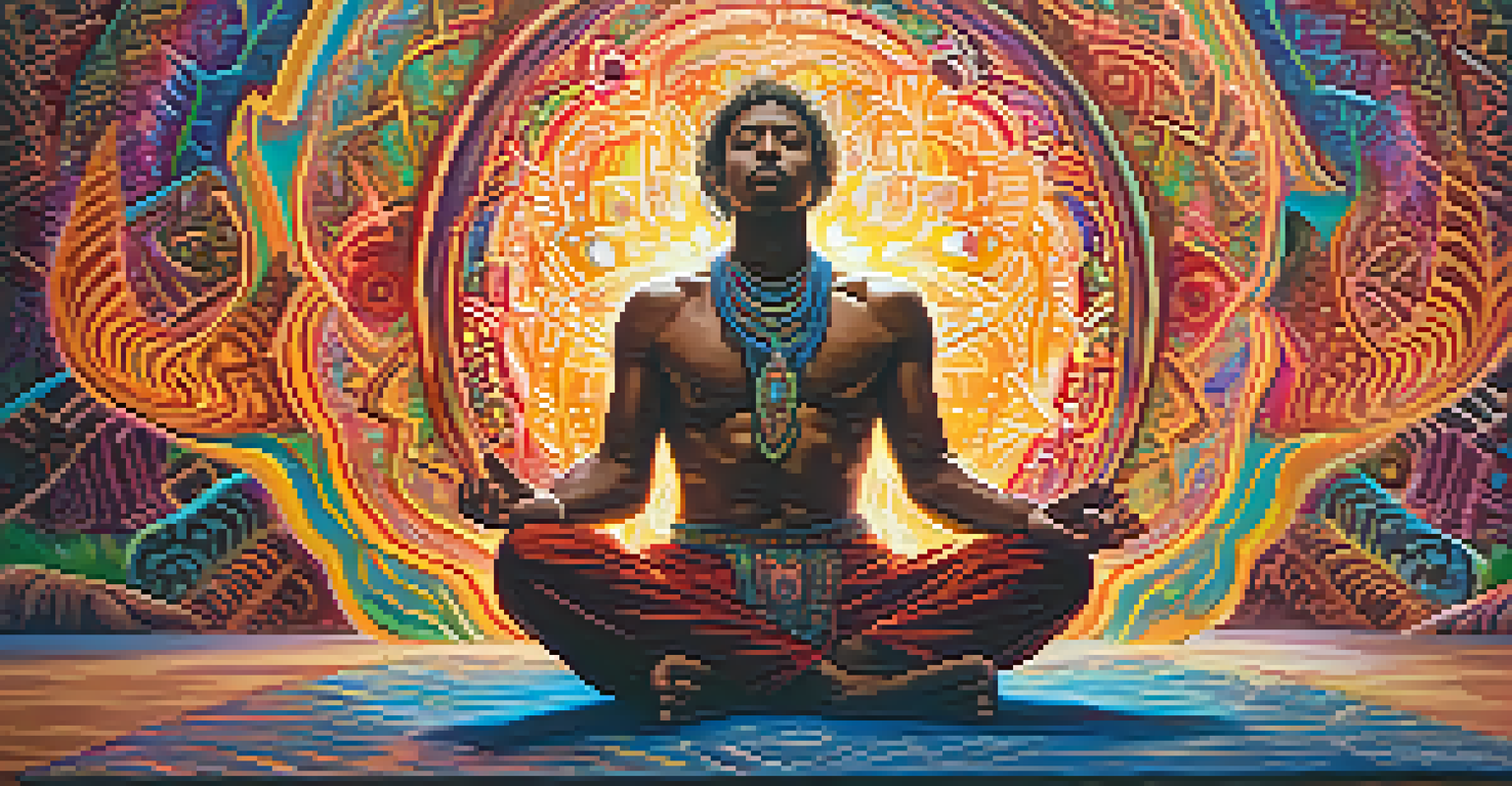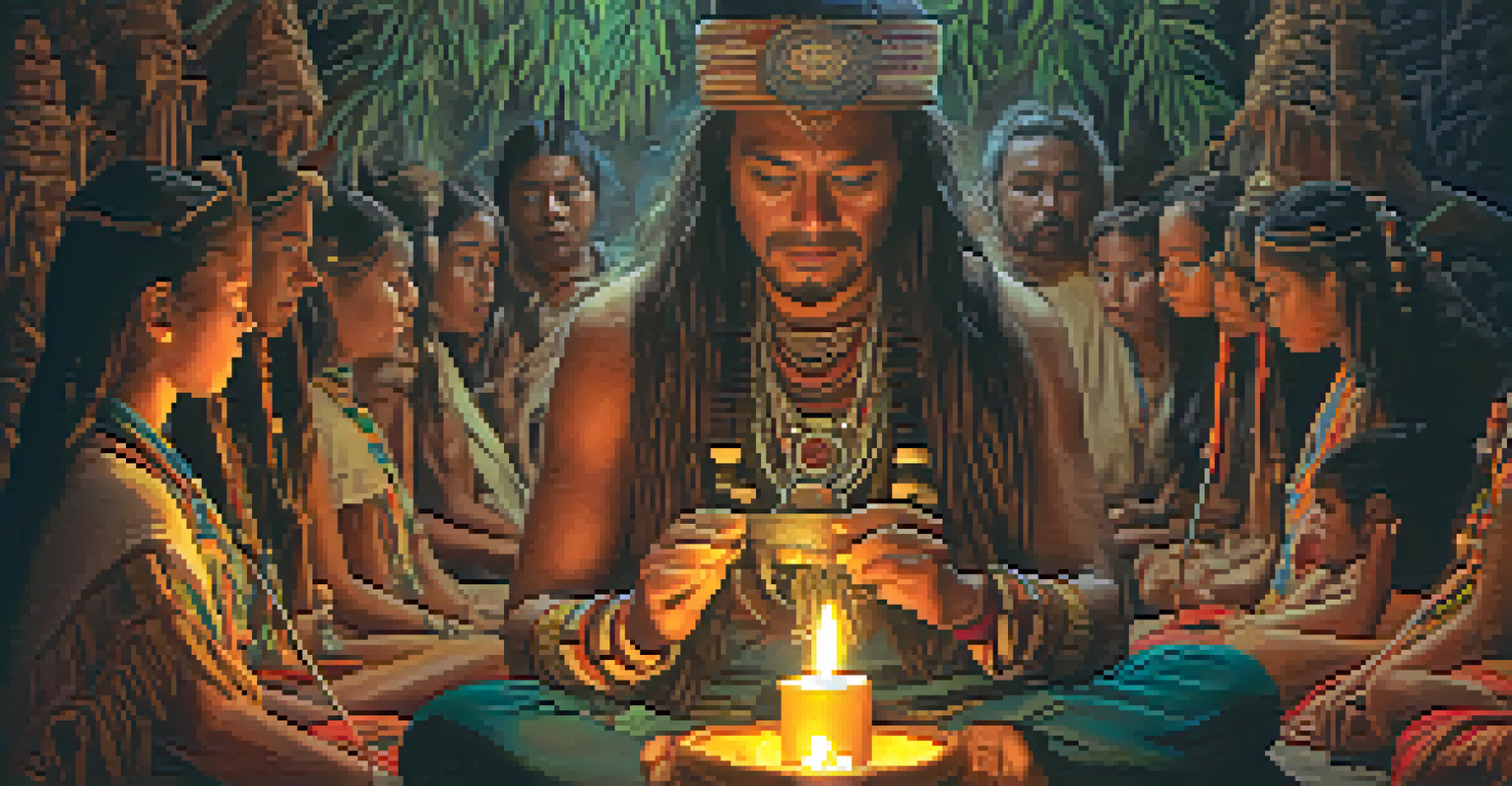Ayahuasca: A Tool for Deep Emotional Exploration and Healing

What is Ayahuasca and Its Origins?
Ayahuasca is a powerful brew made from the Banisteriopsis caapi vine and other plant ingredients, traditionally used by indigenous tribes in the Amazon. This ancient concoction has been utilized for centuries during spiritual ceremonies to promote healing and self-discovery. Its use has spread beyond the Amazon, capturing the interest of those seeking emotional and psychological healing in various cultures around the globe.
The experience of Ayahuasca is a journey into the depths of the self, where you confront your fears and emotions head-on.
The brew contains the psychoactive compound DMT (dimethyltryptamine), which can induce profound altered states of consciousness. In these states, users often experience vivid visions and deep emotional insights. Understanding its origins helps to appreciate its spiritual significance and the respect it commands among indigenous peoples.
While Ayahuasca is often romanticized, it’s essential to approach it with respect and caution. Experiences can be intense and challenging, highlighting the need for proper guidance and a supportive environment during the journey.
The Emotional Benefits of Ayahuasca Retreats
Many participants in Ayahuasca retreats report significant emotional breakthroughs. The experience often allows individuals to confront suppressed feelings and traumas, leading to a deeper understanding of themselves. For example, someone grappling with grief might find clarity about their loss, helping them to heal in a way they hadn't thought possible.

These retreats often take place in serene settings, which can enhance the healing process. Surrounded by nature, participants can connect more deeply with themselves and their emotions. The combination of the brew and the tranquil environment creates a unique space for introspection and growth.
Ayahuasca: A Path to Self-Discovery
Ayahuasca is a traditional Amazonian brew that facilitates profound emotional healing and self-reflection.
Moreover, the supportive community aspect of these retreats fosters a sense of belonging. Sharing experiences with fellow participants can provide additional insights and emotional support, making the journey feel less isolating.
How Ayahuasca Facilitates Emotional Release
One of the most significant aspects of an Ayahuasca experience is the potential for emotional release. Many individuals find themselves expressing feelings they’ve long bottled up, whether it's sadness, anger, or even joy. This cathartic experience can be incredibly liberating, as it allows for a fresh start.
Healing requires a willingness to face the emotions we usually avoid, and Ayahuasca can be a powerful guide in that process.
During the ceremony, participants may encounter visions that help them process these emotions. This might include revisiting past events or understanding their feelings in new ways. Such insights can lead to profound realizations about one’s life and relationships.
The release of these pent-up emotions during the ceremony can also have lasting effects. Many report feeling lighter and more at peace with their pasts, paving the way for healthier emotional habits moving forward.
The Role of Shamanic Guidance in Healing
In traditional settings, shamans play a crucial role in guiding participants through their Ayahuasca journeys. Their knowledge and experience can help steer the experience, ensuring safety and support throughout. A shaman’s presence can turn the journey into a sacred ritual, enhancing the spiritual and emotional benefits.
Shamans often use songs, known as icaros, to create a healing atmosphere. These songs can help participants navigate their emotional landscapes, providing comfort and direction as they face difficult memories or feelings. The connection to the shaman can cultivate a sense of trust, which is essential for a transformative experience.
Importance of Shamanic Guidance
Shamans provide essential support during Ayahuasca ceremonies, enhancing the spiritual experience and ensuring safety.
Moreover, the integration of shamanic practices can deepen the healing process. After the ceremony, shamans may offer insights and guidance on how to apply the lessons learned during the experience to everyday life.
Facing Fear and Anxiety Through Ayahuasca
For many, Ayahuasca serves as a mirror reflecting fears and anxieties that have been avoided for too long. Participants often report facing their deepest fears during ceremonies, which can be both daunting and enlightening. This confrontation can lead to a better understanding of what holds them back in life.
The experience may bring to light the origins of these fears, allowing individuals to process and release them. For instance, someone with a fear of failure might encounter scenarios that help them redefine their relationship with success and failure. This newfound perspective can lead to a more empowered approach to life.
Ultimately, facing these fears with the help of Ayahuasca can lead to personal growth and resilience. Many leave the experience feeling more equipped to tackle challenges, with a clearer sense of purpose.
Integration: Bringing Insights into Daily Life
The journey doesn’t end when the ceremony is over; integration is a crucial step in the healing process. This involves taking the insights gained from the Ayahuasca experience and applying them to everyday life. Without proper integration, the lessons learned may fade away, leaving participants feeling lost.
Many retreat centers offer follow-up sessions or support groups to aid in this process. These can help individuals articulate their experiences and create actionable steps to implement changes in their lives. By sharing their stories, participants can demystify their experiences and make sense of their emotions.
Integration After the Experience
Post-ceremony integration is crucial for applying insights gained during the Ayahuasca journey to everyday life.
Engaging in practices like journaling, meditation, or therapy can also support integration. These tools allow individuals to reflect on their journey and maintain the emotional benefits long after the retreat has ended.
Cautions and Considerations with Ayahuasca
While Ayahuasca can be a powerful tool for healing, it's not without risks. Individuals with certain medical conditions, particularly those related to mental health, should approach with caution. It’s essential to consult with a healthcare professional before participating in any Ayahuasca ceremony.
Additionally, the setting in which Ayahuasca is consumed matters greatly. Choosing a reputable retreat with experienced facilitators can greatly impact the overall experience. A safe and supportive environment can enhance healing and minimize potential adverse effects.

Lastly, it’s important to manage expectations. While many do find profound healing, each individual's experience can vary greatly. Being open to whatever arises during the journey can lead to the most meaningful insights and transformations.